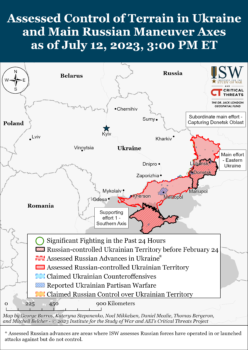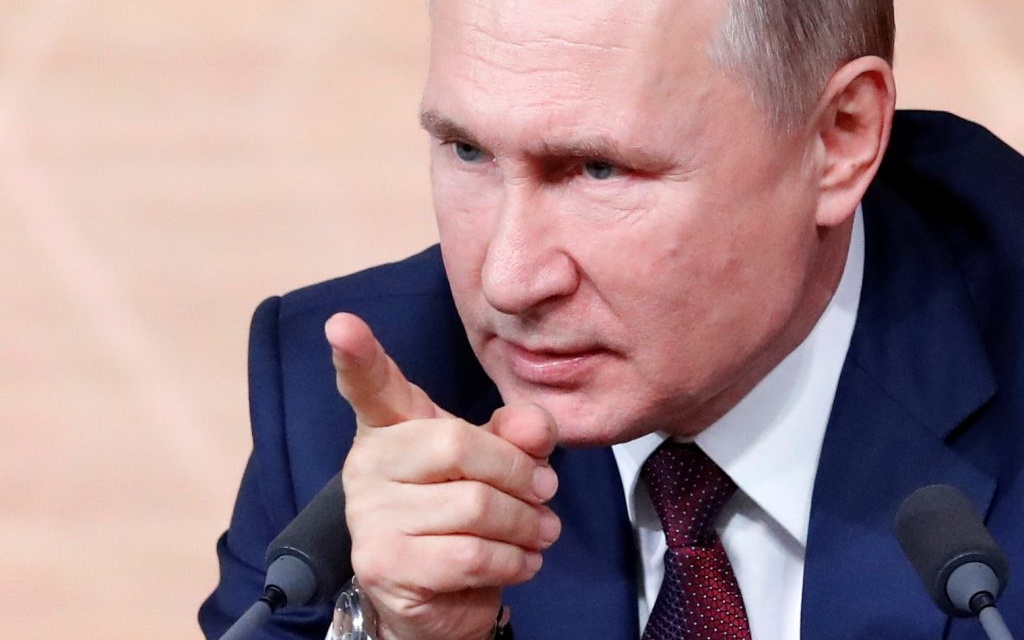EA on Ireland’s RTE: Putin’s Bridge — and Ukraine Invasion — Are Falling Down
Monday’s Coverage: Russia’s Kerch Bridge To Crimea Is Damaged Again

Map: Institute for Study of War
UPDATE 1807 GMT:
Russian authorities have suspended the movement of cargo vessels since Monday through the Kerch Strait, connecting the Black Sea and the Sea of Azov.
The ships were halted following drone attacks on the port of Sevastopol in Russian-occupied Crimea, according to “two industry sources”.
Ukrainian forces have carried out a series of drone strikes since last autumn on Russian military and administrative positions in and near Sevastopol, the headquarters of Moscow’s Black Sea fleet.
Russia’s Defense ministry claimed seven aerial and two maritime drones were intercepted and destroyed on Sunday.
But one source said on Wednesday, “Navigation is already idle for the third day. They stopped it on July 16, around 5 p.m. local time, when there was an attack on Sevastopol.”
UPDATE 0923 GMT:
Ukraine’s Air Force said it downed 31 of 36 Iranian-made Shahed drones and all six Kalibr cruise missiles fired by Russia overnight (see 0646 GMT).
There was a brief, large fire in an industrial facility in the port city of Odesa, and an elderly man was injured by debris.
UPDATE 0902 GMT:
Russia’s Grudzev Sisters, singing for children in Belarus, declare:
So that we live in peace, so that Biden dies, so that…Zelenskiy dies and Putin prospers and takes all of Ukraine.
🤡 "I wish Biden to die, and Zelenskyy to die too, and Putin to prosper": this was the wish of the odious propagandists "Gruzdev sisters" at a concert in a children's summer camp in #Belarus.
By the way, there are children in this camp who were kidnapped by Russian occupiers… pic.twitter.com/JDOH4mjsAU
— NEXTA (@nexta_tv) July 17, 2023
UPDATE 0759 GMT:
UK military intelligence says Russian defenses, built up over months, have been weakened but are still holding out against Ukraine’s counter-offensive in the east and south of the country.
The analysts say “Russian forces are likely fragile but holding for now” on the eastern front around Bakhmut in the Donetsk region. To the south, particulary around Avdiivka, Russian assaults are having “little success”.
On the southern front, Ukrainian attacks on two axes have taken some ground but are “unlikely to have yet broken into Russia’s primary defensive lines”.
In the Kherson region, the counter-offensive is maintaining a small bridgehead on the left (east) bank of the Dnipro River near the ruined Antonivsky Bridge — “an added challenge for Russian commanders who are likely concerned about the vulnerability of their south-western flank”.
Gen. Oleksander Syrskyi, the commander of Ukraine’s ground forces said on Tuesday that “the situation is complicated but under control” in the east.
He said Russia has concentrated forces towards Kupyansk in the Kharkiv region. Both Kupyansk and Lyman were liberated by a Ukrainian counter-offensive last autumn.
On Monday, a Ukraine military spokesperson said Russia has amassed more than 100,000 troops and more than 900 tanks in the area.
UPDATE 0656 GMT:
Russian Deputy Prime Minister Marat Khusnullin says one lane of road traffic has been restored on the Kerch Bridge, damaged by a Ukrainian drone attack early Monday.
“Motor transport on the Crimean Bridge has been restored in reverse mode on the most outer right lane,” Khusnullin wrote.
Meanwhile, the Kremlin’s propagandists fumed on State TV about the damage to the bridge between Russia’s Krasnodar region and occupied Crimea.
The head of RT, Margarita Simonyan, threatened a retaliatory strike on London: “If it is true that the attack on the Crimean Bridge was carried out with the help of British intelligence services, does that make Tower Bridge a legitimate target? Seems pretty legitimate to me.”
But the host of one program, Olga Skabeyeva, was met with a cold dose of reality when she said Russia should capture the port city of Odesa in southern Ukraine. An analyst reminded her that months of Russian attacks could not even occupy a small town in the Donetsk region in the east of the country.
After host Olga Skabeyeva urged Russia to respond to last night’s attack on the Kerch bridge by cutting off Ukraine's access to the Black Sea and taking Odesa, Vladimir Kornilov points out that Russia has been trying to "liberate" the small town of Marinka since spring 2022 pic.twitter.com/HEJKhpDCgs
— Francis Scarr (@francis_scarr) July 17, 2023
UPDATE 0646 GMT:
Russia launched drones and six Kalibr cruise missiles across Ukraine overnight, including on the port cities of Odesa and Mykolaiv in the south of the country.
Mykolaiv Mayor Oleksandr Senkevich said there was a “quite serious” fire over 500 square meters at one facility. An elderly man was injured, and port infrastructure facilities and several private homes were damaged by debris from downed drones.
Oleh Kiper, head of the Odesa region’s military administration, said air defense systems several waves of attacks.
ORIGINAL ENTRY: UN Secretary General António Guterres has said “hundreds of millions of people…will pay the price” for Vladimir Putin’s shredding of a deal which lifted Russia’s blockade of Ukrainian grain exports.
Guterres responded to the renewed threat to ships using three of Ukraine’s ports on the Black Sea.
I deeply regret the decision by the Russian Federation to terminate the implementation of the Black Sea Initiative – including the withdrawal of Russian security guarantees for navigation in the north-western part of the Black Sea.
This Initiative has ensured the safe passage of over 32 million metric tons of food commodities from Ukrainian ports….
At a time when the production and availability of food is being disrupted by conflict, climate change, energy prices and more, these agreements have helped to reduce food prices by over 23% since March last year.
UN Secretary-General Antonio Guterres signaled that Russia's withdrawal from the Black Sea grain deal means a related pact between the UN and Moscow to help facilitate Russia's grain and fertilizer exports was also terminated https://t.co/3y6QvouoBp pic.twitter.com/oPIlq7dYVc
— Reuters (@Reuters) July 17, 2023
Guterres wrote Putin with a proposal last week to keep “alive” the deal, further extending UN support for exports of Russian food products and fertilizers. Turkish President Recep Tayyip Erdoğan said the Russian leader had agreed to the extension of the deal past Monday’s deadline.
But the Kremlin denied Putin had made any statement, rejecting Erdoğan’s assertion that the Russian had scheduled a trip to Turkey next month. Putin told South African President Cyril Ramaphosa over the weekend that he would restore the Russian blockade.
Kremlin spokesman Dmitry Peskov told reporters on Monday that the agreement is “essentially terminated”.
Peskov said Russia could resume participation in the deal “as soon as the relevant agreements are fulfilled”. However, a “senior Russian official at the UN” said the decision was final, even as Russian Foreign Minister Sergey Lavrov and Turkish counterpart Hakan Fidan were scheduled to discuss the situation.
Russia soon threatened to intercept vessels, telling the UN’s shipping agency, the International Maritime Organization, that “the guarantees for the safety of navigation issued by the Russian side will be revoked”.
Pro-active necessary actions and response measures to neutralize threats posed by the Kyiv regime in the area will be taken, considering the continued armed provocations thereby and attempts to attack Russian military and civilian objects.
Putin’s Self-Inflicted Harm?
With the rejection of the deal, Putin seized headlines, only hours after Ukrainian sea drone damaged his flagship project, the Kerch Bridge from Russia’s Krasnodar region to occupied Crimea.
However, he may have further weakened Russia’s economic and political position amid his failing invasion.
Guterres noted that, with the UN’s assistance, “Russian grain trade has reached high export volumes and fertilizer markets are stabilising with Russian exports nearing full recovery, as stated by the Russian Union of Grain Exporters and Russian Fertiliser Producers’ Association”.
However, the Secretary General said Putin had ended the pact between the UN and Moscow as “today’s decision by the Russian Federation will strike a blow to people in need everywhere”.
In his nightly address to the nation, Ukraine President Volodymyr Zelenskiy said he spoke with Guterres on Monday about the continuation of the Black Sea shipments. He explained that Russia had no right to determine who had enough food to eat.
Snubbed by Putin, Turkey’s Erdoğan maintained — despite the Kremlin’s denial — that they will discuss the deal in person in August.
“I hope that with this discussion, we can make some progress and continue on our way without a pause,” he said.
A “UN source” noted that, well before Monday, Russia was obstructing the Joint Coordination Center implementating the grain deal: “There were more arguments about the operations here – the way that ships were allowed to take part, the way ships were inspected, at all phases of the operation there was more tension.”
The US Ambassador to the UN, Linda Thomas-Greenfield, told reporters:
Russia has dealt another blow to the world’s most vulnerable, this time by suspending its participation in the Black Sea grain initiative. This is really another act of cruelty.
China’s Ambassador Zhang Jun said, “We still hope that by accommodating the concerns of all parties…then we can find a package solution.”
Putin is likely to face the challenge of defending the decision at an African-Russian economic summit in St Petersburg later this month. He also added another question mark over his attendance at the BRICS [Brazil-Russia-India-China-South Africa] summit in South Africa in August.
South African Vice President Paul Mashatile has asked Putin not to join in person in Johannesburg. Pretoria is obligated to enforce the International Criminal Court’s arrest warrant for Putin, over Russia’s mass deportations of Ukrainian children.
Murithi Mutiga, the director of the Africa programme of the International Crisis Group, summarized:
The impact of the collapse of the grain deal in Africa will be substantial. Much of the grain did not find its way to poorer countries as the UN had initially envisioned but the effect of the deal was to stabilize supply on the world market and keep prices relatively stable.
Many countries on the continent face double-digit inflation and some such as Nigeria, Kenya and Ghana have already witnessed protests over rising food and fuel prices. If the deal cannot be revived and prices rise further, as a consequence, that will compound the economic crisis multiple countries face, which in turn could foment more unrest.

